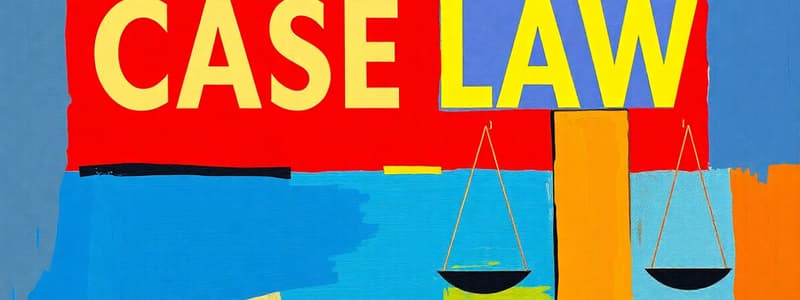Podcast
Questions and Answers
What initiates civil litigation?
What initiates civil litigation?
- A judge's ruling
- Submission of evidence by witnesses
- A jury's deliberation
- Exchange of written documents (correct)
In what scenario can judges be considered to indirectly make law?
In what scenario can judges be considered to indirectly make law?
- When they apply existing legal rules to cases (correct)
- When they create new statutes
- When they declare new rules of law
- When they interpret statutory law
What is the primary source of common law?
What is the primary source of common law?
- Statutory laws enacted by Parliament
- Local customs from different regions
- International treaties
- Judicial decisions made by courts (correct)
What alternative can judges pursue when there is no established rule of law to apply?
What alternative can judges pursue when there is no established rule of law to apply?
What does 'judge-made' law refer to?
What does 'judge-made' law refer to?
What role did the King’s Chancellor play in the context of common law?
What role did the King’s Chancellor play in the context of common law?
Which of the following best describes the nature of common law?
Which of the following best describes the nature of common law?
What was a significant change in law application in England after the 14th century?
What was a significant change in law application in England after the 14th century?
Judges in civil trials have the direct authority to create new laws.
Judges in civil trials have the direct authority to create new laws.
The common law developed in England created a uniform body of law applicable by the King’s courts after the 14th century.
The common law developed in England created a uniform body of law applicable by the King’s courts after the 14th century.
Judges are often required to apply established rules of law and do not typically encounter case scenarios without established legal precedents.
Judges are often required to apply established rules of law and do not typically encounter case scenarios without established legal precedents.
Pleadings are initial written documents exchanged to clarify the nature of a dispute in civil litigation.
Pleadings are initial written documents exchanged to clarify the nature of a dispute in civil litigation.
Before the 14th century, the application of law in England was uniform across the country.
Before the 14th century, the application of law in England was uniform across the country.
The outcomes of civil trials hinge on the subjective arguments presented by each party, rather than established legal principles.
The outcomes of civil trials hinge on the subjective arguments presented by each party, rather than established legal principles.
Interpretation of existing laws is one of the methods judges can use when they encounter cases without established rules.
Interpretation of existing laws is one of the methods judges can use when they encounter cases without established rules.
Judge-made law refers to the formal enactment of statutes by legislative bodies.
Judge-made law refers to the formal enactment of statutes by legislative bodies.
What is the primary function of 'pleadings' in a civil trial?
What is the primary function of 'pleadings' in a civil trial?
How do judges contribute to the development of common law?
How do judges contribute to the development of common law?
What is one way judges can handle cases that do not have an established rule of law?
What is one way judges can handle cases that do not have an established rule of law?
Explain the term 'common law' as applied in the courts after the 14th century in England.
Explain the term 'common law' as applied in the courts after the 14th century in England.
What is meant by 'judge-made' law in the context of the judicial system?
What is meant by 'judge-made' law in the context of the judicial system?
In what scenario might judges be required to declare a new rule of law?
In what scenario might judges be required to declare a new rule of law?
What role does the presentation of evidence play during a civil trial?
What role does the presentation of evidence play during a civil trial?
Why is it significant that judges apply law in a 'strict legalistic way' under common law?
Why is it significant that judges apply law in a 'strict legalistic way' under common law?
Civil litigation begins with an exchange of written documents called ______.
Civil litigation begins with an exchange of written documents called ______.
When judges cannot find an established rule of law, they can ______ an existing rule to establish its meaning.
When judges cannot find an established rule of law, they can ______ an existing rule to establish its meaning.
Judges have no direct authority to 'make' law, but they can create ______ law when deciding cases.
Judges have no direct authority to 'make' law, but they can create ______ law when deciding cases.
The body of case-law established after the 14th century in England is known as ______.
The body of case-law established after the 14th century in England is known as ______.
Judges may extend an established rule of law to a ______ situation when necessary.
Judges may extend an established rule of law to a ______ situation when necessary.
Before the 14th century, laws in England were based on local ______ and customs.
Before the 14th century, laws in England were based on local ______ and customs.
In civil trials, evidence is presented by witnesses or through producing ______ to establish facts.
In civil trials, evidence is presented by witnesses or through producing ______ to establish facts.
The court decides what facts are proved and what ______ applies to the case.
The court decides what facts are proved and what ______ applies to the case.
Flashcards are hidden until you start studying
Study Notes
The Role of Courts in Law-Making
- Courts play a crucial role in shaping and applying the law through case law.
- The process of litigation begins with written documents (pleadings) to define the dispute.
- Trials involve presenting evidence from witnesses and documents to prove facts.
- Both parties present arguments on the relevant law and its application.
- The court determines the facts, applies the law, and issues a ruling.
Judge's Power to Make Law
- Judges are expected to apply existing law, but they indirectly make law through case decisions.
- Case law is a significant source of law, despite judges lacking direct authority to create new laws.
Opportunities for Judges to Make Law
- Judges may declare a previously unwritten rule as Australian law.
- They may interpret existing rules to establish their meaning.
- Judges can extend established rules to new situations.
Development of the Common Law
- Before the 14th century, local laws and customs varied across England.
- The King's courts established a uniform common law replacing local laws.
- Case law became a central element of the common law system.
- The common law is applied in a strict and legalistic manner.
- Appeals from common law courts were initially directed to the King's Chancellor.
The Role of Courts in Law-Making
- Civil Litigation starts with exchanging written documents ("pleadings") to clarify the dispute.
- Court Trials involve presenting evidence from witnesses and documents, where each party argues their case based on the law.
- Judges decide the facts and apply the law, resulting in an order.
Judge's Power to Make Law
- Judges are expected to apply existing law.
- They don't have direct authority to "make" law, but they make law indirectly when deciding cases.
Opportunities for Judges to Make Law
- Applying Established Rules: Judges usually find an existing rule and apply it.
- Finding No Established Rule: When no rule exists, judges have options:
- Declare a previously unwritten rule as Australian law.
- Interpret an existing rule to determine its meaning.
- Extend an existing rule to a new situation.
How English Judges Developed Common Law
- Before the 14th century: Different parts of England had their own laws.
- After the 14th century: The King's courts implemented a uniform body of law ("common law") across England, replacing local laws.
- Common Law Nature: It's applied strictly and legally.
- Appeals: Originally, appeals from common law courts were heard by the King's Chancellor.
Role of Courts in Law-Making
- Civil Litigation: Starts with "pleadings" (written documents) to define the dispute. Then, the trial focuses on evidence from witnesses and documents to establish facts.
- Judge's Role: Expected to apply existing law, but can indirectly make law through decisions.
- Opportunities to Make Law:
- Declare New Law: Can create new rules of law based on unwritten rules, natural law, or custom.
- Interpret Existing Law: Define the meaning of existing law.
- Extend Existing Law: Apply established law to new situations.
Common Law Development
- Before 14th Century: Different local laws and customs existed in various parts of England.
- After 14th Century: The King's courts established a uniform "common law" system, replacing local laws.
- Common Law Characteristics: Known for being strict and legalistic in its application.
- Appeals: Appeals from common law courts went to the King's Chancellor.
THE ROLE OF THE COURTS IN LAW-MAKING
- The judicial system in Australia primarily involves applying existing laws to specific cases.
- Judges are expected to interpret and apply established legal principles.
- While judges are not explicitly authorized to create new laws, their decisions in cases can indirectly establish new legal precedents. This is commonly referred to as "judge-made law".
BASIC PROCEDURE IN A CIVIL CASE
- Civil litigation commences with an exchange of written documents, known as "pleadings", to clearly define the nature and scope of the dispute.
- During trials, evidence is presented through witness testimonies or documented materials to establish the factual basis for the plaintiff's and defendant's claims.
- Both sides present their legal arguments, focusing on the relevant laws and how they should be applied to the case.
- The court determines the proven facts and the applicable law.
- The final decision is based on the law and results in an appropriate order.
OPPORTUNITIES TO MAKE LAW WHEN DECIDING CASES
- In most cases, judges apply existing established legal principles.
- When a clear existing rule of law is not available, judges employ various options:
- Establishing a new rule of Australian law that was previously unwritten or derived from natural law or custom.
- Interpreting an existing law to clarify its meaning.
- Extending an existing rule of law to a new situation.
HOW ENGLISH JUDGES DEVELOPED THE COMMON LAW
- Before the 14th century, diverse local laws and customs prevailed throughout England.
- After the 14th century, a uniform legal system, known as the "common law", was introduced by the King's courts, replacing the existing local laws.
- The common law system is characterized by its strict legalistic approach to interpretation and application of legal principles.
- Appeals from common law courts were initially addressed to the King's Chancellor.
Studying That Suits You
Use AI to generate personalized quizzes and flashcards to suit your learning preferences.




